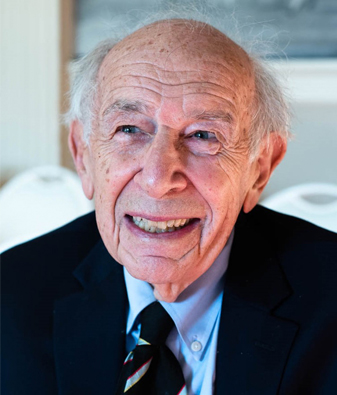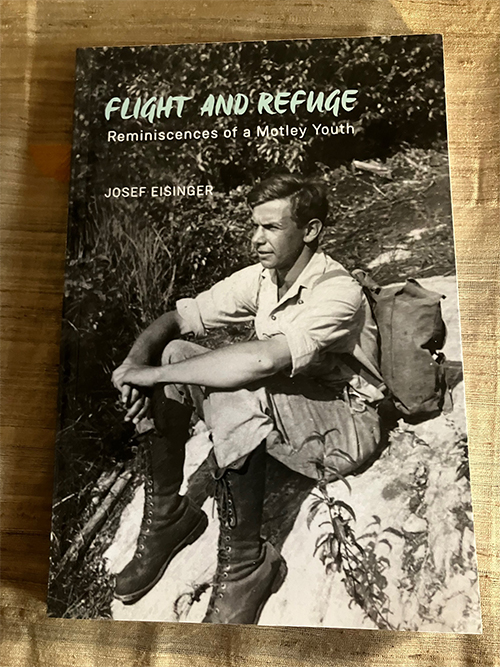A teenage Josef Eisinger escaped Nazi persecution in occupied Austria when he joined a transport of Jewish children permitted to emigrate on the eve of the Second World War.
Just 15-years-old when he arrived in England, he was abandoned by his sponsor, found work as a farm hand and dishwasher but was then interned along with other supposed “enemy aliens” living near the coast when a German invasion of England appeared imminent after the defeat of France.
He was shipped to Canada where he learned to fell trees in New Brunswick while studying in an informal school organized by internees. When a German Jewish refugee family living in Toronto sponsored Eisinger, he was released from internment as a student.
“I wasn't just a refugee. I was still considered an enemy alien and had to report to the Royal Canadian Mounted Police once a week,” says Eisinger, who received his bachelor of arts as a member of University College in 1947 and his master of science in physics at U of T in 1948. “But when I entered the University of Toronto, and particularly University College, as a student it was my Shangri-La. I couldn't have asked for anything better,” he says.

“It opened up the world to me. I fell in love with college life, with English literature, with mathematics and with physics. I also fell in love with spectroscopy, which I used in one form or another for the rest of my scientific career.”
In 1944, he interrupted his studies to enlist in the Canadian Army after many months of petitioning the government to let him and others in his situation serve their new country.
Eisinger returned to U of T to complete his MSc before earning a PhD in physics from the Massachusetts Institute of Technology (MIT) in 1951.
Now 99 years old, Eisinger is a retired professor emeritus from the Mount Sinai School of Medicine in New York, where he lives with his wife of 60 years, cellist and renowned music historian Styra Avins. They have two children and two grandchildren.
His remarkable career includes two Guggenheim Fellowships, more than 200 articles in professional journals, two books about Albert Einstein and two memoirs.
Glimpses: A Sundry Life was published earlier this year and includes some of Eisinger’s artwork. His earlier memoir, Flight and Refuge. Reminiscences of a Motley Youth includes recollections of his student days at U of T, and stories about how he and his parents escaped the Nazis.

“I was probably never happier than I was at the University of Toronto in the 1940s,” says Eisinger, who enjoyed a rich academic and student life that included playing flute in the student orchestra.
As his classmates graduated and took jobs in the private sector, Eisinger pursued a career in academics. He flourished doing spectroscopical research work under the auspices of renowned U of T physics department Professor Harry Welsh, who recommended him to the physics department at MIT. Lured by a teaching fellowship, he felt obliged to move.
“That's how I came to leave Canada, very reluctantly. I'd fallen in love with the country. But everybody told me I had to go to MIT,” says Eisinger, whose doctoral thesis investigated the internal structure of atomic nuclei.
“A lot of faculty at MIT had just come back from the Manhattan Project, so nuclear physics was king.”
After earning his PhD, Eisinger joined Bell Labs for more than 30 years and was then appointed biophysics professor at the Mount Sinai School of Medicine before becoming an author.
The fondness and attachment for U of T runs in the family, says Eisinger. His sister, Lesley Wyle — who helped him escape from the Nazis — was 101 years old when she died earlier this year in Toronto. She, too, took courses at U of T, and her daughter graduated from University College.
With his 100th birthday on the horizon in March 2024, Eisinger is enjoying the pleasure of watching his grandchildren grow up while he works on new projects and contemplates the legacy he’ll be leaving behind.
He has some straightforward advice for today’s U of T students, especially those starting over after fleeing conflicts and war.
“Concentrate on the good things you find here because you'll never get rid of all the bad things in this world,” he says.
“Enjoy this opportunity and soak up the culture in Canada. It’s a new life in a wonderful country and your student years won't last forever.”

